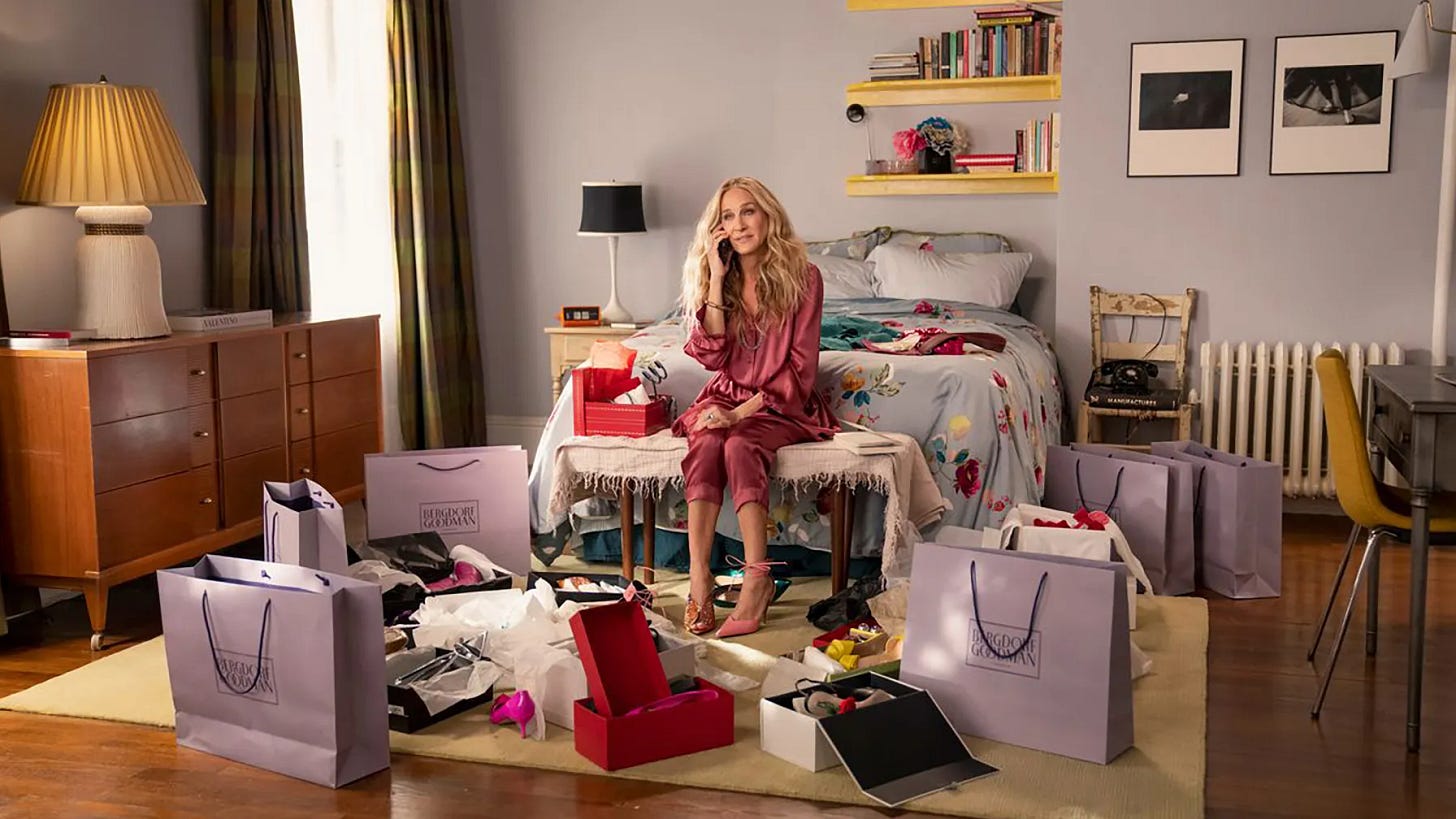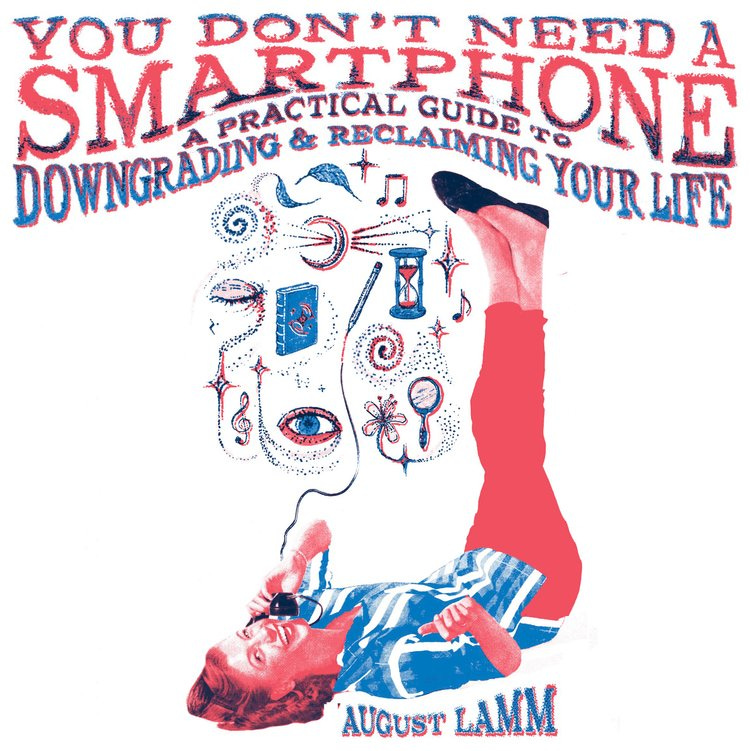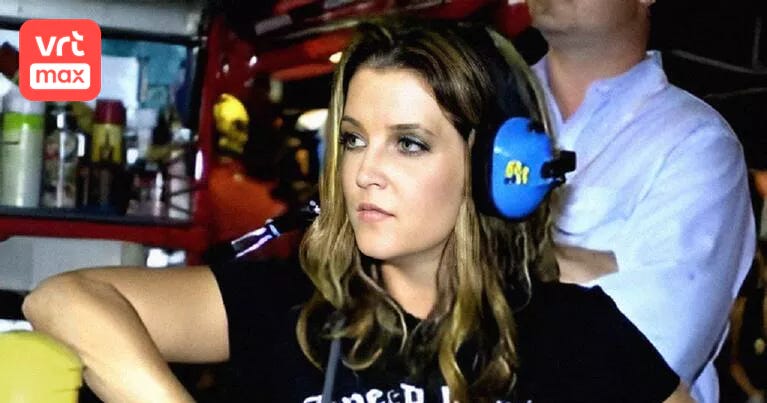In her review of Carrie M. Lane’s new book More than Pretty Boxes: How the Rise of Professional Organizing Shows Us the Way We Work Isn’t Working, New Yorker writer Jennifer Wilson briefly summarizes the history of clutter, which unfolds in an unsurprising cycle, a push and pull between maximalism and minimalism; of mass-produced knickknacks and (William Morris might argue) real, collection-worthy artwork; Marie Kondo and those who would accuse her of insensitivity to hording-as-trauma response.
2020, Wilson notes, was the year of organization; it was also a year where personal consumption kicked into hyperdrive, propelled by a cocktail of fear, scarcity (real and perceived), boredom, loneliness and (for some) an unemployment insurance windfall. I, for one, could suddenly afford to buy things that, as a lifelong underearner, I’d never been able to afford before. I couldn’t go out and do the things I normally spent my time and money doing, so online shopping replaced experiences.
It’s in the wake of this shift I started to notice the lack of a counternarrative to this level of consumption, though it had probably disappeared long before I noticed. When I was a teenager I felt a strong sense of anti-consumerism. To be part most any quasi-intentional community, whether it be a DIY collective or a church, meant that you’d probably at least pretend to hold these views. But there were also more barriers in place. I’d always enjoyed shopping when I had the chance, and flipping through mail-order catalogs. But any such time-and-space separation between me and the objects of my fleeting desires no longer exists. And no one will look askance at what I buy as long as it’s bought “ethically,” and/or from a small and/or local business. All that’s left, then, is a thin curtain called willpower.
Wilson writes that as our work lives take over more and more of our time, buying things becomes an stand in for life. Instead of working on a novel, “they buy a Moleskine. Instead of traveling they accrue travel points.” TikTok, she adds, is rife with “unboxing videos by “aspiring influencers showing off their ‘hauls’ from low-cost retailers like Shein to get views.” These women, she adds “—it’s mostly women—are not lifestyle shopping, they’re shopping for their lives.”
Every so often I find myself in conversation with these sorts of aspiring influencers who, in the pursuit of internet fame (and attendant material security) feel pressured to farm out their every waking moments in exchange for, if they’re at least minimally successful, free shit and maybe invitations to “activation events” for various major corporations. These sorts of people are almost invariably positive to the point of delusion and also totally exhausted.
If I sound a little judgmental it’s because I am, a bit. Personally it seems like a very unsatisfying way to spend ones life, considering the almost universally meager return on the time investment. But I’m also sympathetic. I know from experience how bad it feels to be in a constant cycle of intake and regurgitation, scrolling and posting; polluting my own brain and environment with a constant stream of distracting noise; feeling the need to create something, anything; to go viral, lest you cease to exist.
Virality itself is a self-fulfilling selling point for all kinds of cheap miscellanea — note the prevalence of online ad copy bragging that this or that item sold out in 10 minutes or “broke the internet.”
This past spring Trader Joe’s introduced a collection of mini tote bags which went viral, attracting mobs to stores, and launching a predictably over-valued online market. Discussing the phenomenon with my sister (a Trader Joes employee), our friend Jackie mentioned seeing a news story about the totes. The anchor had explained that part of the appeal of the bags was that self-branding as a Trader Joe’s fan signaled a kind of humility. The act of buying a cheap branded canvas bag — and more importantly, showing off that purchase online — is itself perceived as a symbolic act of anti-consumerism.
The problem is, of course, the internet. Or more specifically, having the internet on our phones. Smartphones blend everything — communication, work, leisure, romance, art, entertainment, shopping, ideas— into a smooth, bland slurry of impressions and vibes and Pavlovian urges. The things that make life worth living are diminished as everything flattens out.
As Molly Young put it on Substack earlier today,
The internet hasn’t killed eccentricity but it makes it harder for anyone who lives (at least partly) online to live a specific life. The internet either crushes specificity, mocks it, ignores it, assimilates and commodifies it, or all of the above. It leads to a personality type that Henry James described in The Wings of the Dove: “You're familiar with everything, but conscious, really, of nothing.”
I’m thinking about this because it’s the absolute tail end of the season of End of Year lists and, as I wrote last year, EOY lists make feel bad about a lot of things, including the state of music media, the internet, my phone, the streaming model, arts funding, my career, etc. The tradition has always felt like a bit of a marketing rat race, but — for me, at least — unmitigated access to basically any new album has rendered even the most casual of year-end ranking overwhelming and chore-like, to write or to read. This doesn’t just apply to music, but for me that’s the area where I feel this impact the most.
You might be saying, “Margaret, have you considered talking to a professional? You sound really, really…really depressed.” Well, isn’t everyone? In the last couple of weeks I’ve seen a lot of people post their reflections of 2024, and many, if not most of those reflections include some variation of “this was a tough one,” or “worst year of my life!” or “this year sucked but next year will be worse.” Many objectively bad things happened this year, but I believe that, for the reasons I’ve detailed and more, life has simply become a little bit harder to enjoy.
In her beautiful and practical how-to pamphlet You Don’t Need a Smart Phone, artist August Lamm writes that constant, on-demand access to audio, be it music, podcasts or audiobooks robs us of time alone with our thoughts; constantly wearing headphones makes us less aware of our surroundings, and makes us less able to share experiences with the people around us; endless listening dulls our appreciation of what we’re listening to. We may not be conscious of nothing but we’re certainly conscious of less.
The effect of downgrading to a “dumb phone,” she writes, is to “disambiguate these technologies, spreading them across multiple devices so that it becomes possible to focus only on one chosen device at a time, to direct all your attention toward talking on the phone or watching a movie or writing a note or selecting an album. As a result you’ll find it easier than ever to remain present, to accomplish and enjoy your tasks with minimal distraction along the way.”
Is 2025 the year I downgrade to a flip phone? I want to … but do I want to badly enough? The boundaries and organization required is daunting. Lamm herself says that once she decided she wanted to get rid of her smartphone it took 5 years to actually do it.
Anyway. Despite all of this I do believe it’s good to reflect on the passage of time, and the things that were experienced and enjoyed. So here are, in no particular order, a few things, mostly not new, and including a few material goods (sorry), that made an impression 2024.
Linda Smith
When Spotify told me that this pioneer of home taping was my most listened-to artist of the year I immediately bought all her albums from Bandcamp, which, I know, I should have done in the first place. As I wrote for Dusted, Smith marries minimalist elegance and woozy playfulness, and her recordings are “full of boney drum beats and “96 Tears”-esque Wurlitzer-y riffs, cool garage-rock hooks, clever melodies, dry humor and smart, idiosyncratic lyrics.” Influential yet obscure, recent reissues by Captured Tracks have ushered in at least a little bit of the attention and credit that Smith richly deserves.
The Sopranos Soundtrack - Full Playlist
I’m in the middle of my third Sopranos watch and yet again I’m struck by the perfection of the soundtrack. Eternally grateful to this Spotify user for collecting all 527 of these tracks in one place.
[Below is one of my current favorite rewatch discoveries]
Karma solid perfume (Lush)
This is a real back-to-basics perfume for me. I started wearing it in the latter half of my 20s and it makes me nostalgic for a time in my life that was not very good, but could, like this perfume, be described as “heady.” To my nose this is all creamy, woody, comforting citrus. Some, citing hippie related trauma, will object to the lurking patchouli but to those people I say “grow up.”
The Morning Star, The Wolves of Eternity and The Third Realm by Karl Ove Knausgaard
Knausgaard’s novels are, like the rest of his word, meandering, philosophical, minutia-focused, and totally absorbing. These three books take a non-linear trip around and through the lives of a number of tangentially-related Norwegians and a few Russians, all of whom begin to notice strange occurrences which may or may not be related to a large new star that has appeared in the sky. The major question of the series is, What if death could be cured? And in service of that question Knausgaard takes many a detour. One imagines these books are his way of processing his own study of subjects from Christian theology to the lives of fungi to obscure black metal. No lose ends have yet been tied (there are still two volumes yet to be translated to English) but the lack of resolution in no way detracts from the pure enjoyment of the reading experience.
Cindy Lee - Diamond Jubilee
A lovely, odd and sprawling collection of eclectic lo-fi garage pop made all the more endearing by the method of release. At first the record was only available to stream on YouTube (fine if you subscribe, annoying if you don’t), or for purchase via Realistik Studios’ Geocities website. Either way you probably had to go at least a little bit out of the way to check it out. Now you can get it on Bandcamp, which feels almost too convenient. Proof that it can be 2006 if we want it!
Yellow Rose (Boyds of Texas)
I chose this at random at a fancy San Antonio market this past November and it’s gotten quite a bit of mileage since. Not as rosy as the name implies, nor as armpit-y as the cumin top note might suggest, this hits a nice balance between wearable and a little bit weird. It’s spiced but not spicey and antique without being elderly. It reminds me a little of Stetson and a little of Hiram Green’s Hyde. If you find the former too unfashionable and the latter too bloody, this is a relatively inoffensive alternative.
Ladies of Leisure (Capra,1930)
Hardly Frank Capra’s best work, but funny and modern and risqué in that pre-code way. I’m not sure why Barbara Stanwyck has to cry as much as she does but I really love the way her teeth look.
Dan Spencer - Return to Your Dark Master
One of the few records from this year that I listened to more than just once or twice. I’ve already written at length about Mr. Spencer, but IKYMI here it is.
From Here to the Great Unknown by Lisa Marie Presley and Riley Keough
I only ever knew Lisa Marie Presley as fodder for tabloids and late-night opening monologues, and I always did think she seemed strange. There was the Michael Jackson marriage of course, but she also struck me as unpleasant, withdrawn and uneasy in a way that didn’t jibe with my (admittedly ill-informed) idea of Elvis.
It’s true that she was withdrawn: She was shy and hated talking about herself, which made the prospect of writing a memoir very hard. “She was so wracked with self-criticism that working on the book became incredibly difficult for her,” writes her daughter Riley Keough in the introduction to From Here to the Great Unknown. “I don’t think she fundamentally understood how or why her story should be told.” When Presley died in 2023 she left hours of memoir interview recordings which Keough used, making good on a promise to help her mother finish the project.
If there was ever a book to buy at the airport this is it: informative/educational, juicy and very, very easy to read. I actually feel an oddly high level of gratitude that Presley managed to get her story out in the world. She brings her incredibly strange life down to earth, offering — among other things — a unique perspective on one of the most written-about men to ever live. Many of the stories are really sad, and Presley often comes across as an unreliable narrator (Keough occasionally corrects the record) but she also creates an intimacy with the reader, as though she’s entrusting us with precious and secret knowledge. Which, I guess, she is.
Sebastian Stan
I loved Stan as Tommy Lee in Pam & Tommy which was, overall, just ok. The Apprentice (2024) was also ok, not bad at all, really. But Stan, amazingly, manages to play Trump as a real person instead of a parody. I’m sure some would argue of the dangers of humanizing the guy, but for better or worse I walked away feeling like I understood Trump’s ‘whole deal’ a little bit more clearly. Stunning stuff!
Heritage Store Rosewater & Glycerin Hydrating Facial Mist
This was the year my normally resilient and cooperative skin started to break out. This bummed me out intensely and I was forced to become a skincare minimalist, which is frankly for the best considering that I supposedly abhor over-consumption. I’ve settled on a three-part routine: La Mer foaming cleanser (bit pricey for me but my boss gave me a large bottle for my birthday), La Roche-Posay double repair face moisturizer and most importantly Heritage Store brand rosewater/glycerin mist. If I could chose one of the three I’d stick with the rosewater. It tones, it moisturizes, it freshens, it smells nice, it’s pretty cheap, like 10-11 bucks at Whole Foods. The Trader Joe’s crap doesn’t compare.
Cecil B. Demented (Waters, 2000)
If you look like any of these people DM me.









whoa. totally fits my mood and the weather today.